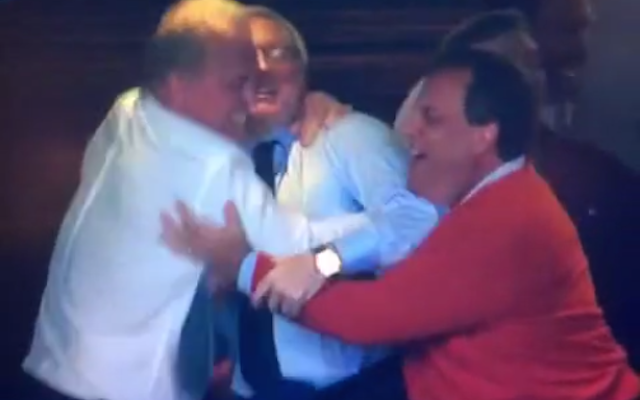Jack Nicholson. George W. Bush. Steve Perry. Paul Rudd. Bradley Cooper. The list of celebrities (a term which I will use very loosely throughout this piece) and big-named figures can go on and on. Just because these guys call either the stage or the movie screen their home, they're still human. And because they're human, they must have some sort of interests, right? Some people are a lot more louder than others, of course, but I digress. But lately, you're seeing a lot more focus on some of the star power that have local roots and a giant love for their hometown teams.
Some of those guys have been around for a very long time, such as Jack Nicholson, who practically has his own seat in the front row at the Staples Center. Guys like him are such a staple (no pun intended) that they're hardly given much notice because of their infamous love for the team. The same would apply to George W. Bush, who has a near-permanent seat along the backstop for the Texas Rangers' games in Arlington. [FYI: The baseball stadium is now known as Globe Life Park in Arlington. They've changed their stadium name almost as much as where the Miami Dolphins play, which has been Sun Life Stadium since 2010.]
Outside of these notables, you don't get to see the big names on screen until a team makes the playoffs, or has a really good run and may do so. During the 2014 MLB Postseason, the country saw a celebrity face of the Kansas City Royals in actor Paul Rudd. Opposing him? Only the former (and best known) frontman of the rock band Journey, Steve Perry, who is a huge fan of the San Francisco Giants. In fact, he actually came out of the shadows during the Giants' World Series run in 2010 after hearing everyone sing "Lights" and "Don't Stop Believin'" and he hasn't left their lights ever since.
 |
| The hug shown 'round the country. (Photo from CBSSports.com) |
Recently, we saw a new, and somewhat controversial fan revelation. During the Sunday afternoon flag pickup spectacular between the Dallas Cowboys and Detroit Lions, America saw New Jersey governor Chris Christie rooting for the Cowboys and later hugging owner Jerry Jones after the Cowboys win (picture above). It wasn't exactly the first time we saw this, as Christie was rooting for them during a Monday night game in nearby Philadelphia where the Cowboys faced the Eagles two weeks prior. Granted, to someone like me, it isn't a big deal on who he roots for, but it is a big problem for other people when the state he govern hosts two teams in the Giants and Jets, and he's right next door to Eagles fans (although, technically, there are some regions of South Jersey that can count as Philly Part 2). It's also an even bigger problem when his brother also goes on Facebook and mocks Eagles fans, but this post isn't about that guy. Who is he, anyway? Never mind.
Why do we obsess and gloat over these things? Granted, it was super attractive to see Bradley Cooper wear his hometown team's colors in the 2012 film Silver Linings Playbook, but why else do we get overly excited when we see a celebrity rooting for a team? To be honest, there are times in which I absolutely cannot stand seeing the cameras cut to an actor or a singer watching/enjoying a game. For now, they are among us. Yes, they're titans in whatever they do, but this is a form of them unwinding. Good Lord. They don't want to be on camera for a little while. Chillax, yo. But this is something we can definitely ask ourselves. Why? Does it give us more of a reason to stick with our teams through thick and thin because they are? Possibly. What a better cheerleader than someone who we may look up to and admire to tell us to keep going? Sometimes, it'll make you feel like somebody, like the city has a spokesperson that delivers some outside-of-sports credibility.
On the other hand, some people just might not care. It's just like: "Oh, there's so-and-so sitting there in their expensive seats. Who cares?" It could just be publicity that is the furthest thing from necessary. Like I mentioned above, some celebrities aren't even given a gander anymore because of their frequent sightings at games and their inability to "go away," as it were. That, or the common fan says: "Okay, that's enough of you. Shut up and sit down." It's like the more that apathy exists, the more these instances of celebrity sightings at games gets increasingly annoying, because people don't ask why they're shown constantly on our televisions.
It isn't a terrible thing to see big names cheer on equally as big names. Why? It shows a different dimension to people we're used to seeing perform another job or another task. It shows how multidimensional we can be. It's like knowing that professional athletes might play Dungeons & Dragons and be really good at it. It's knowing little things like that that doesn't make us seem so weird anymore. It's okay to like sports and do something completely different on the side. Like I've said before, sports brings everyone together. It might show a side that we're not used to or not ready for, but it's still a great start, right?
--AZ
(So, since I mentioned Bradley Cooper in this piece, I'm doing this. We're both Phillies fans. Who wears the Phillies shirt better? Me? Or him? That's okay...you can say that he wears it best. I wouldn't be mad.)

No comments:
Post a Comment